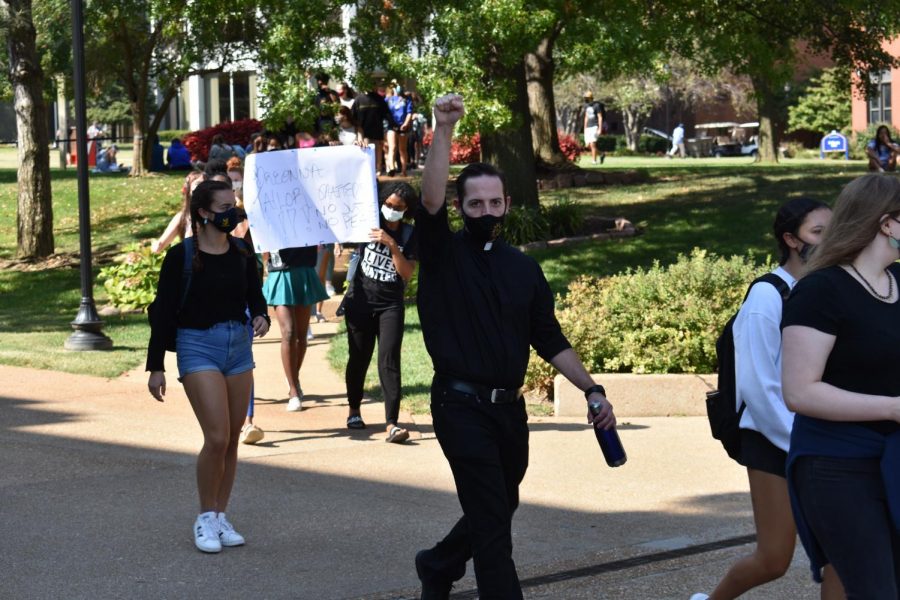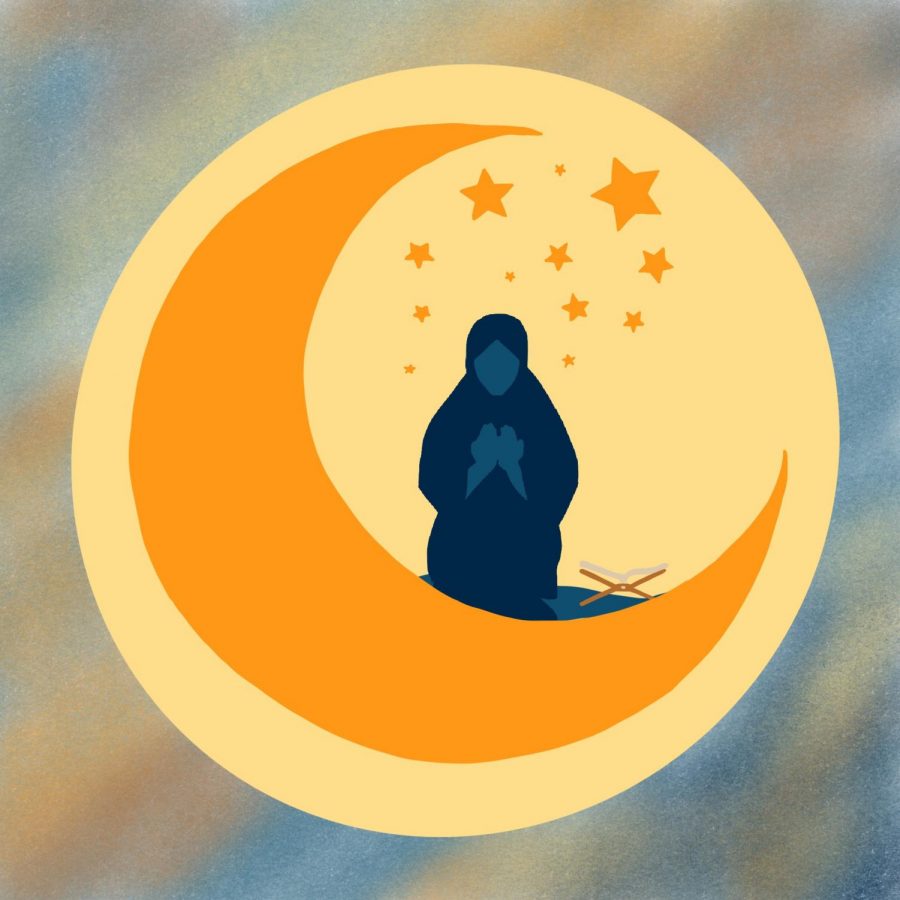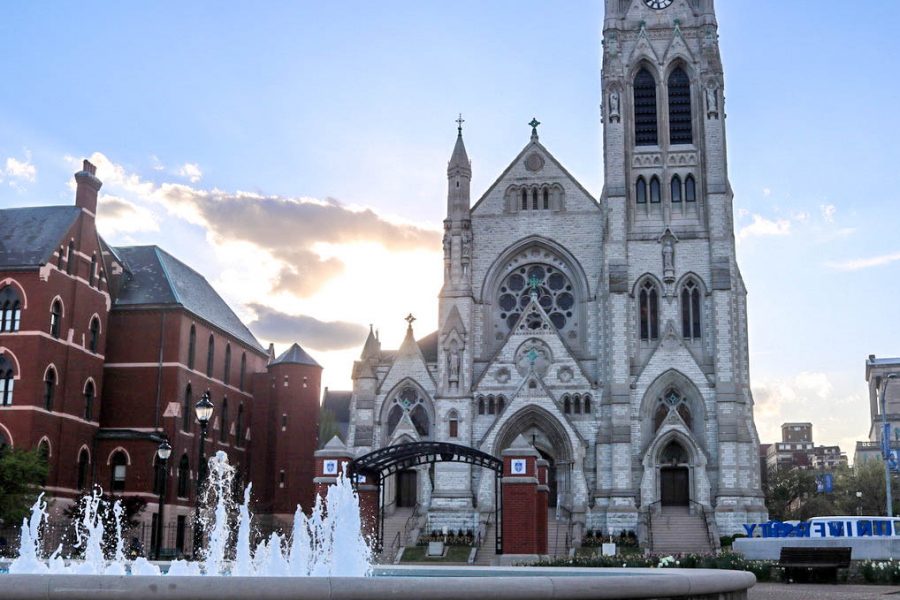It so happened that when one of my students asked me about writing something for the new The University News Religion column, I was in the midst of writing a paper proposal for a conference on “The Role of the Theologian in the Public Square.”
As a campus minister rather than a professional theologian, that question has shaded away for me from being an academic into the larger question of the role of the academy, especially the Catholic academy, in the public square.
Theology students or not, Christian or not, religious in any way or not, all of us at SLU work and study under the aegis of a Jesuit mode of education. What difference does that make? You study the same kinds of things as your peers at other universities (with the addition of a few required theology classes), you gain comparable expertise in your given career paths, you encounter the challenges of the job market just like people from other schools. What, then, might be the role of the theologically informed university in the public square?
Thomas Merton (1915-1968), a Trappist monk and perhaps the best-known Catholic writer of the twentieth century, did not work at a university or hold any credentials as an academic, but he was someone who spent a great deal of time thinking about the place of education as a mode not only of instruction but of formation, of transformation.
In an essay entitled “Learning to Live,” written for students at his alma mater, Columbia University in New York City, Merton argued that “the function of the university is to help men and women save their souls and, in so doing, to save their society: from what? From the hell of meaninglessness, of obsession, of complex artifice, of systematic lying, of criminal evasions and neglects, of self-destructive futilities.” (359) A bit of a far cry from getting a degree in math or social work or something, maybe, but maybe not. By the by, if “saving one’s soul” sounds a bit more theological than you care to be, consider Merton’s explanation of that most elusive of concepts, the soul: “the ‘self’ that is found after other partial and exterior selves have been discarded as masks….the radical self in its uninhibited freedom. The self no longer clothed with an ego.” (362)
How easily can university education become an exercise in learning to conform, wear the right mask, play the game, become an operator? We need to be saved, then, not from a God who is going to send us to hell, but from the hell of our own making, “the machine,” the whole system of falsehoods which we are socialized into believing is “reality.” Society, he notes, “continues to do you the service of keeping you in disguises, not for your comfort, but for its own” (360) – that is, by educating you into a task, making you “useful” to itself, it can exert a pretty potent kind of control over you. (*Note the frenzied scramble among your peers who are entering the job market…*)
He adds, “The danger of education, I have found, is that it so easily confuses means with ends. Worse than that, it quite easily forgets both and devotes itself merely to the mass production of uneducated graduates – people literally unfit for anything except to take part in an elaborate and completely artificial charade which they and their contemporaries have conspired to call ‘life.’” (364)
The means, that is, taking this and that class, writing this and that paper, are hardly the same thing as the ends, which are in no way to be limited to merely being a person who “knows a lot of stuff” and has the necessary skills to get a job. Fine on its own terms, that fails to address the fundamentally human and humanistic nature of education; it is a cliché to say that teachers don’t teach subjects, they teach students, but it is a cliché because it is true. While this is not limited to a liberal arts education, the very idea of the liberal arts is the formation of freedom; however, since we tend to think about freedom as “no one telling me what to do,” let me clarify what freedom really means, using basketball as an example.
Despite the way we usually think, the “freest” person ever to play the game is not some kid messing around on the court, with no one telling him what to do, but someone like Michael Jordan, who trained and studied other great players for a long, long time to develop the range of excellences that allowed him the true freedom to go do just about anything he wanted on the court.
Similarly, the formation of freedom, which I (and Merton) would argue is the ultimate goal of the university, is learning from the grand insights and the terrible mistakes of humanity over the sweep of history to become more fully human as individuals and as a society – free from the falsehoods of the mass mind as manifest in “isms” of every stripe, free from self-aggrandizement, and free from the lie of “success” as the goal of the human enterprise. We need only watch a few moments of reality television to see that one can be wildly “successful” by the conventional definitions of the word and have not an inkling of how to navigate the human condition.
Merton puts it thus: “If you have learned only how to be a success, your life has probably been wasted. If a university concentrates on producing successful people, it is lamentably failing in its obligation to society and to the students themselves.” (365) Or, in other words, “The problem with running the rat race is that even if you win, you’re still a rat.”
We are here not simply to learn to play the game of business, law, medicine, whatever, but to challenge those games to become more humane, more in keeping with the true needs of the world, more means of enabling people to pursue the grand question that we as humans are.
The fact that you are at SLU means that you are intelligent enough to become successes in just about any endeavor you care to pursue. What (I hope) we are doing here is not only equipping you for those endeavors but focusing that intelligence to see beyond the brass ring of success as it is usually presented.







